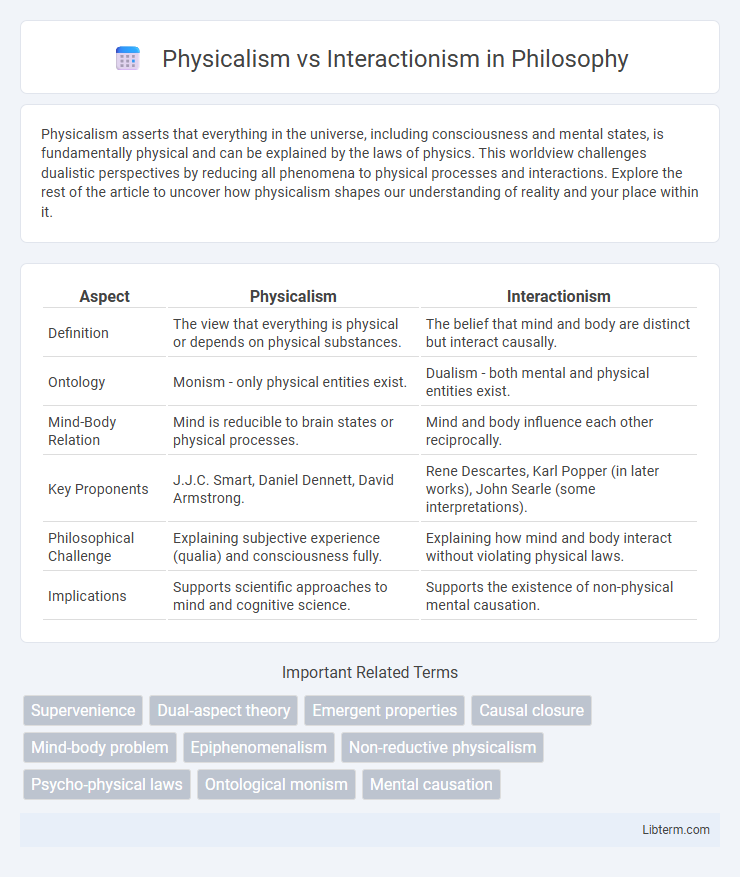Physicalism asserts that everything in the universe, including consciousness and mental states, is fundamentally physical and can be explained by the laws of physics. This worldview challenges dualistic perspectives by reducing all phenomena to physical processes and interactions. Explore the rest of the article to uncover how physicalism shapes our understanding of reality and your place within it.
Table of Comparison
| Aspect | Physicalism | Interactionism |
|---|---|---|
| Definition | The view that everything is physical or depends on physical substances. | The belief that mind and body are distinct but interact causally. |
| Ontology | Monism - only physical entities exist. | Dualism - both mental and physical entities exist. |
| Mind-Body Relation | Mind is reducible to brain states or physical processes. | Mind and body influence each other reciprocally. |
| Key Proponents | J.J.C. Smart, Daniel Dennett, David Armstrong. | Rene Descartes, Karl Popper (in later works), John Searle (some interpretations). |
| Philosophical Challenge | Explaining subjective experience (qualia) and consciousness fully. | Explaining how mind and body interact without violating physical laws. |
| Implications | Supports scientific approaches to mind and cognitive science. | Supports the existence of non-physical mental causation. |
Introduction to Physicalism and Interactionism
Physicalism asserts that everything in the universe, including mental states, is ultimately physical or supervenes on physical entities, emphasizing a monistic ontology grounded in the laws of physics. Interactionism, a dualistic perspective, posits that the mind and body are distinct substances that causally interact, challenging the physicalist claim by maintaining the irreducibility of mental phenomena. These contrasting views address the mind-body problem by debating whether consciousness and mental experiences can be fully explained through physical processes alone or require non-physical explanations.
Defining Physicalism: Principles and Assumptions
Physicalism asserts that everything that exists is physical or depends on physical properties, emphasizing that all phenomena, including mental states, are ultimately reducible to physical processes. This principle relies on the assumption that the universe is governed by natural laws describable by physics, rejecting non-physical substances or entities. Central to physicalism is the notion of ontological monism, which posits that only one kind of substance--the physical--is fundamental to reality.
Understanding Interactionism: Core Concepts
Interactionism posits that mind and body are distinct substances that causally influence each other, emphasizing a two-way relationship between mental states and physical processes. Central to this view is the contention that mental phenomena cannot be fully explained by physical properties alone, requiring acknowledgment of non-physical mental causation. Key concepts include mental causation, dualism, and the challenge of explaining how immaterial mind interacts with the physical brain.
Historical Development of Both Theories
Physicalism emerged from the 19th-century scientific revolution, rooted in materialism and the success of physical sciences explaining natural phenomena. Interactionism, influenced by Cartesian dualism, developed in the 17th century, emphasizing a two-way causal relationship between mind and body. The historical progression of physicalism shifted from strict materialism to contemporary forms incorporating neuroscience, while interactionism faced challenges with mechanistic science but persisted in philosophical debates on consciousness.
Major Philosophical Arguments for Physicalism
Physicalism asserts that everything that exists is physical or dependent on physical processes, supported by the argument from causal closure which states physical events have only physical causes, ensuring consistent scientific explanations. The success of physical sciences in explaining mental phenomena through neuroscience and psychology strengthens the argument for physicalism by demonstrating empirical correlations between brain states and mental states. Moreover, the principle of parsimony, or Occam's razor, favors physicalism by rejecting unnecessary dualistic explanations when physical explanations suffice.
Critiques and Challenges to Physicalism
Critiques of Physicalism emphasize its difficulty in fully explaining subjective experiences, or qualia, which challenge the notion that all mental states are reducible to physical states. Interactionism raises questions about how non-physical mind substances could causally influence the physical brain without violating physical laws. Physicalism faces challenges addressing the explanatory gap between conscious experience and brain activity, suggesting potential limits to a purely physical account of the mind.
Empirical Evidence Supporting Interactionism
Empirical evidence supporting interactionism includes experimental findings in psychophysiology demonstrating bidirectional influences between mental states and brain activity, such as placebo effects altering neurochemical responses. Neuroimaging studies reveal correlations where conscious intentions correspond with specific neural activations, suggesting mental causation beyond mere epiphenomena. Moreover, anomalies in materialist explanations, like the persistence of subjective experience despite neural damage, challenge strict physicalism and corroborate interactionist perspectives.
Key Differences Between Physicalism and Interactionism
Physicalism asserts that all mental states and consciousness can be fully explained by physical processes in the brain, emphasizing a monistic view where only physical substances exist. Interactionism posits a dualistic framework, where the mind and body are distinct entities that causally affect each other, highlighting the mind's non-physical influence on the physical brain. The key difference lies in physicalism's rejection of non-physical substances, while interactionism maintains a dualistic interaction between mind and matter.
Implications for Mind-Body Problem
Physicalism asserts that mental states are entirely reducible to physical processes in the brain, implying a unified ontology that avoids dualist separations. Interactionism posits that the mind and body are distinct substances that causally influence each other, presenting challenges for explaining how non-physical mental states can affect the physical brain. The implications for the mind-body problem center on whether consciousness and subjective experience can be fully explained by neuroscience or require a dualistic framework acknowledging separate mental and physical realms.
Future Directions in Consciousness Studies
Future directions in consciousness studies emphasize integrating neurobiological data with physicalist frameworks to elucidate the neural correlates of consciousness, while interactionism research explores potential mechanisms for mind-body causal exchanges beyond current physicalist explanations. Advances in quantum physics and computational neuroscience offer promising approaches to resolving the explanatory gaps between subjective experience and physical processes. Interdisciplinary methodologies leveraging brain imaging, artificial intelligence, and phenomenological analysis are expected to deepen understanding and challenge existing paradigms in the mind-body problem.
Physicalism Infographic

 libterm.com
libterm.com